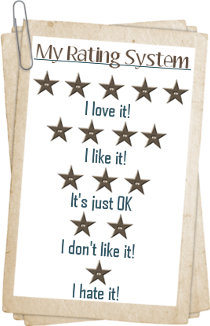To celebrate the paperback release of Allison Hoover Bartlett’s The Man Who Loved Books Too Much: The True Story of a Thief, a Detective, and a World of Literary Obsession, I’m having a copy sent to one lucky winner! Enter to win this Indie Next selection, Barnes & Noble Discover pick, and Library Journal “best books of the year” – a book “not only about a collection of crimes, but about people’s intimate and complex and sometimes dangerous relationship to books” – by leaving a comment about any book you obsessively love on this post on the main 1st Books blog. Better yet: link to this giveaway on your own blog and paste your post link into your comment to win two copies if your name is drawn: one for yourself, and one to giveaway on your blog.
- Please note: To win, posts must be on the main blog post, not on Goodreads, SheWrites, Redroom, or other places the blog appears.
 While walking the dog the other day, I ran into an old friend, someone whose kids had gone to preschool with my own. When I told her that my book was about to be published, she said she remembers when I first started talking about wanting to write. It was at the playground, while we parents sat by the edge of the sandbox, hungry for conversation with fellow adults. She told me she remembers this because she’d heard it from a lot of parents back then—that they’d wanted to write or go to law school or start some other career—but that nobody else had. Why I did remains something of a mystery to me. What I know is that it had nothing to do with having had more confidence or talent than those who did not pursue their dreams; it was simply that writing gave me joy and I wanted to do it more than anything else.
While walking the dog the other day, I ran into an old friend, someone whose kids had gone to preschool with my own. When I told her that my book was about to be published, she said she remembers when I first started talking about wanting to write. It was at the playground, while we parents sat by the edge of the sandbox, hungry for conversation with fellow adults. She told me she remembers this because she’d heard it from a lot of parents back then—that they’d wanted to write or go to law school or start some other career—but that nobody else had. Why I did remains something of a mystery to me. What I know is that it had nothing to do with having had more confidence or talent than those who did not pursue their dreams; it was simply that writing gave me joy and I wanted to do it more than anything else.I had been an English lit major in college and while I loved reading, I loved writing critical papers even more. I remember composing one in particular, on one of my favorite poems at the time, Alexander Pope’s “Essay on Criticism,” (ironic, I know), which I wrote late into the night in iambic pentameter, mimicking the form of the essay. It was probably dreadful, but I had a great time doing it, and my professor seemed to have appreciated the effort. One of the hazards of being a lit major, though, was that I was so awestruck by the greats, I didn’t want to even attempt to write in a serious way.
I did always write for work, though—ad copy, proposals, newsletters, marketing brochures—and found it somewhat satisfying. But somewhat wasn’t enough. Later, when I became one of those parents sitting on the edge of the sandbox, I decided to take the plunge and begin writing. I remember how it came about. I had taken a year off work after my daughter was born and was thinking about the next step in my life. My 4-year old son came home from preschool one day and announced that he and his classmates had learned about hobbies, and that the teacher had asked them if their parents had any. I asked him what his answer was. “I told her Daddy plays the guitar,” he said. “What about me?” I asked. “You go to garage sales,” he said. That was it. Time to start writing.
(To be honest, it’s true that I go to garage sales, for the same reason I go to flea markets: I’m always in search of interesting objects, preferably with stories behind them, a pastime that helped me understand the book collectors I met while writing The Man Who Loved Books Too Much. But going to garage sales as my main interest? No way.)

I enrolled in a couple of creative writing classes at UC Berkeley Extension, and found that writing filled a hole in my life that was left by my quitting dancing at the age of 16. That was the last time I had been dedicated to a creative pursuit that was terribly demanding, painful at times, but ultimately gratifying, even joyful. Studying ballet seriously (6 – 7 days a week) turned out to be good training for writing, which is also terribly demanding, painful at times, but ultimately gratifying, and in the best moments, even joyful.
While writing, that joy springs from discovery, which for me is what it’s all about. Some writers of fiction are surprised to find out that we non-fiction writers don’t always know what we’re writing about when we set out to tell a story. In fact, even when I think I know what I’m about to write, I often find I’m wrong, and the path leads in a wholly unexpected direction. I may know the facts of a story, but in the process of putting it into words and thinking deeply about it, I discover the meaning of a person’s actions, connections between ideas, subtleties in the details. I find the heart of what I’m writing.
In those classes at UC Extension, I met a few like-minded women and joined a writing group. (This group’s members have changed a little over the years, but it was the core of the group I still meet with bi-weekly, North 24th.) A few months later, I started writing pieces for neighborhood newspapers, then worked my way up to national newspapers and magazines. After years of this, I wanted to find a story rich and complex enough for a book. At the time, I was drawn to the arts and sciences, ideas and discoveries, but a friend gave me a wise piece of advice: whatever you do, find interesting characters.
One day, while visiting a friend, he showed me a book he’d come across. It was a Renaissance-era German botanical medicine book, a resource akin to today’s Merck Manual. It was heavy and beautiful, with hand-painted illustrations and brass clasps to secure it shut. I’d never seen anything like it. There was a note with the book, and the circumstances described in it were fishy enough to make me wonder if the book was stolen. For the rest of the day, I couldn’t stop thinking about it, so the next morning, determined to find out where this book was from and whom it belonged to, I looked online, typing “stolen rare books.” For a writer always on the lookout for a good story, it was like opening a treasure chest. While I didn’t find any information about the German book, I did find countless stories of theft. I also learned that rare book theft has been rampant for centuries and that, as luck would have it, the most prolific thief in recent times—and one who stole not for profit, but for a love of the books—happened to be from the Bay Area, where I lived. I set out to find him, and the rest of the story lies in the pages of The Man Who Loved Books Too Much. – Allison
Postscript: When I finished writing this, I realized it makes the journey from non-writer to published author sound so smooth, almost effortless. This is as far from truth as you can get. Many times I have wanted to quit. Often, while struggling with a piece, I’ve started writing an essay for myself entitled “Why Write?” I’ve never finished this essay. What keeps me going are two observations a wonderful writing teacher, Jane Anne Staw, told me whenever I hit a low point: 1) writing is an act of faith; and 2) good things happen to those who keep writing. I repeat these truths to myself when the going gets tough, and it always does.




















